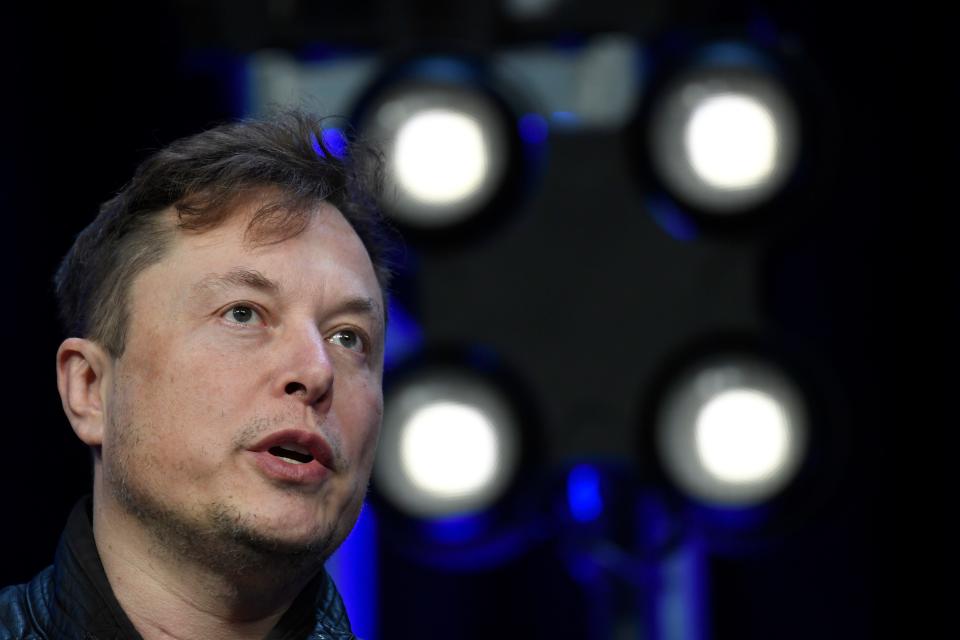Lynn Smith: The magnificent madness of Musk
- Oops!Something went wrong.Please try again later.
- Oops!Something went wrong.Please try again later.
“Surveillance capitalists know everything about us, whereas their operations are designed to be unknowable to us. They accumulate vast domains of new knowledge from us, but not for us.” — Shoshana Zuboff, "The Age of Surveillance Capitalism"
In April, when Elon Musk acquired Twitter in a deal valued at $44 billion, he played the free speech card … again. Peeking out of his cannabis cloud, he mused, “Free speech is the bedrock of a functioning democracy, and Twitter is the digital town square where matters vital to the future of humanity are debated.”
So, Elon … your Twitter deal is all about the future of humanity? Really?
Relative to free speech, Elon’s advocacy has been mostly targeted toward his ardent fans and promoters. In fact, Musk famously seeks to control what journalists and bloggers say about his businesses, his products and himself. Musk has even sought to silence his own customers by demanding that non-disclosure agreements be signed prior to even routine car repairs. As recently as 2021, participants in Tesla’s experimental autonomous vehicle program were required to “keep your experiences in the program confidential” and not to “share any information about the program with the public.”

In addition, he expressly prohibited screenshots, blog posts or social media postings. Musk doesn’t care much for free speech when it’s leveled against him, and cares even less about social media’s responsibility to provide factual content, so it’s highly unlikely that the world will become a better place once he allows every wingnut on Twitter to yell “Fire!”
For years, Musk has used Twitter to promote his business interests and shape his public image, and with this particular purchase, he boosted his Twitter followers from 90 million to 500 million overnight. Make no mistake about it, Musk’s acquisition of Twitter is all about self-promotion and his data collection businesses, period. Elon knows that corporations are willing to spend almost any amount of money for information that allows them to target potential customers, so he’s certain that the 21st century will be all about data collection, and hopefully, a bit about him. Through Twitter’s use of algorithms that provide a frighteningly accurate assessment of our preferences, Musk has acquired a massive amount of actionable data, but Twitter is not his only window into consumer behavior.

When Musk founded Neuralink in 2016, he began the development of a brain chip that would allow people to control electronic devices with their thoughts. Because the proposed “Link” is an implanted device connecting the human brain with technology, the goal is for autonomous use of phones, computers and connection to the internet. His chip will allow us to communicate more easily via text, to express our creativity through photography and art, and, yes, to buy the online stuff that we’re simply thinking about. Musk, of course, will know exactly what we’re buying and who’s in the business of selling it. And then … he’ll sell us to them.
Even Don Draper would blush.
Elon’s SpaceX’s internet service, called Starlink, is comprised of a constellation of low-orbiting satellites, and capable of bringing connectivity to locations where the internet is unreliable or unavailable. In addition to obvious beneficiaries like aircraft and spacecraft, Musk is focused on connecting remote areas to the internet, as well. Because his satellites are networked together and so close to Earth, they can beam large amounts of data anywhere on the planet, and at faster clips than fiber-optic cables. Every time that we access the internet, we leave a digital footprint, and through his existing operations at Tesla, Starlink, now Twitter, and someday Neuralink, he is creating a data mining behemoth that could ultimately be more powerful than Google and Facebook, combined.
More: Lynn Smith: Efficiency at the expense of resiliency
More: Lynn Smith: Cold War freedom fighters
Subscribe: Get unlimited access to our local coverage
And so, it’s tough to ignore this particular irony: While whining about too much oversight, and too little freedom, Musk has become the sultan of surveillance.
Elon Musk is a remarkably intelligent and capable engineer who manufactures magnificent rockets and electric vehicles. And his dedication to the environment is admirable and deserving his great success. But, he cannot engineer human speech or control its cultural consequences. And because he revels in the juvenile and petulant exchanges that make Twitter unbearable for most of us, it’s unlikely that he’ll even try to fix it.
We should never forget that his purchase of Twitter, like his establishment of Starlink and Neuralink, is all about mining our digital data, and then retaining it for his use, or selling it to the highest bidder. His burgeoning businesses may be confusingly complex, but his motivations are crystal clear.
— Community Columnist Lynn Smith is a retired wealth management executive who resides in Holland. Contact her at lynn.angleworks@gmail.com.
This article originally appeared on The Holland Sentinel: Lynn Smith: The magnificent madness of Musk

